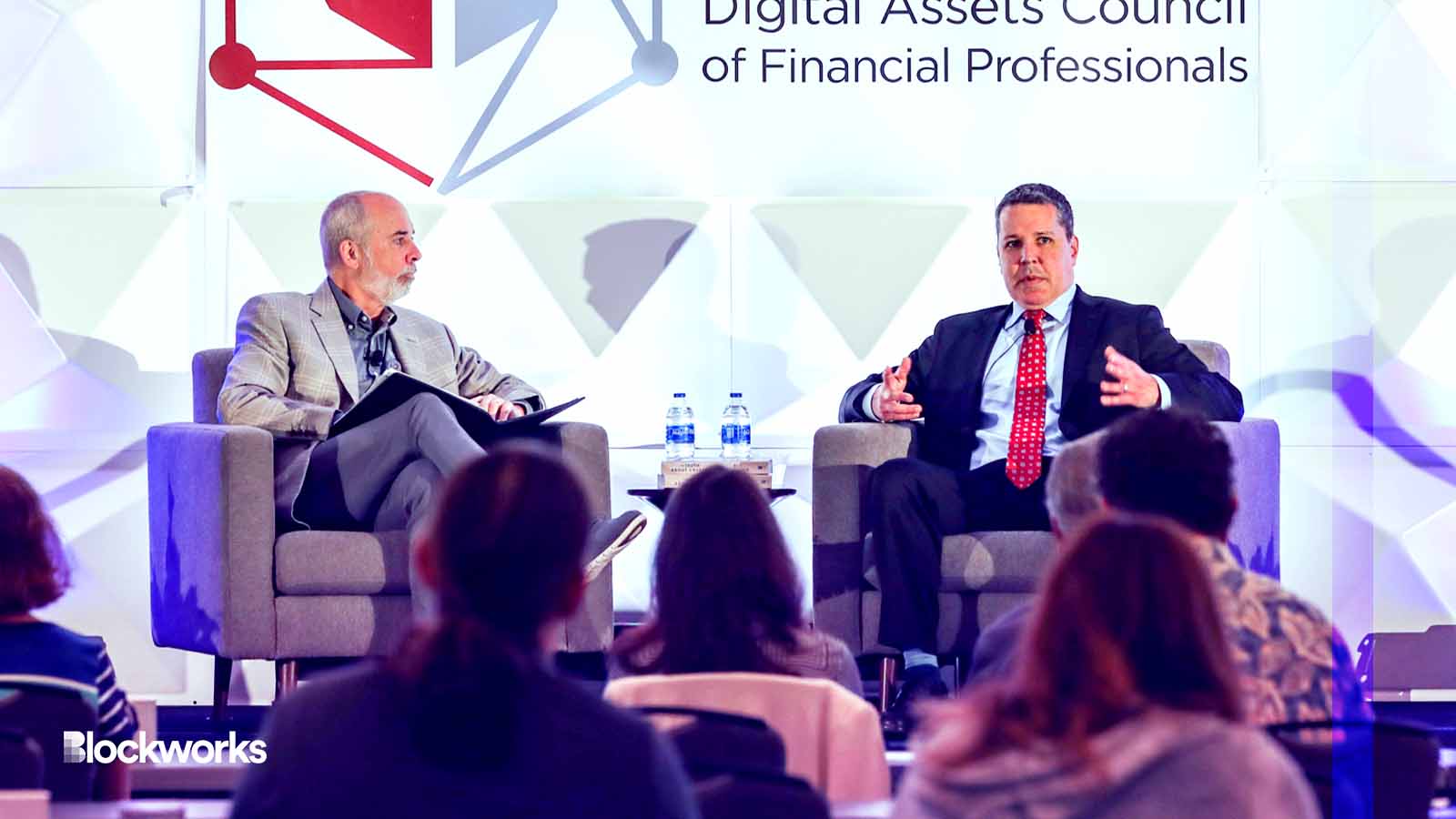SEC’s Hirsch faces the music: ‘What the hell are you doing?’
The SEC’s David Hirsch said the agency is not looking to drive crypto offshore, but seeks to continue “pursuing claims for the unregistered offer and sale of securities”

DACFP – VISION 2023 modified by Blockworks
About a week after the SEC made headlines for suing Binance and Coinbase a day apart, the crypto unit chief within the regulator’s enforcement division took the stage Wednesday at a conference run by the Digital Assets Council of Financial Professionals.
DACFP founder Ric Edelman turned to the SEC’s David Hirsch. His first question: “What the hell are you doing?”
The inquiry was a cheeky way to begin an hour-long conversation looking to unpack the SEC’s latest crypto enforcement tactics.
Included in the SEC suits against the two crypto exchange giants: controversial allegations that Binance and Coinbase were listing unregistered securities.
Read more: The SEC Says These Crypto Assets Are Securities: Their Reasoning Is Wrong
Hirsch cited the Howey test in making those classifications, adding that the judicial system is an “established and effective method” for resolving disputes.
He said the SEC is not trying to drive the industry outside of the US, adding that he believes crypto’s underlying technology is “here to stay.” Hirsch clarified that he was expressing his own views, not necessarily those of the regulator.
“Allowing a liquid, fully-functioning financial system to exist in parallel with our regulated financial system is perilous in my mind,” he said.
“We’re not your lawyers”
Despite acknowledging critiques of “regulation by enforcement,” Hirsch pushed back on the categorization.
The commission has had rules on the books dating back to the 1940s. While the SEC has put forward a “sincere effort” to provide guidance where it can, “we’re not your lawyers,” Hirsch said.
“You have to hire attorneys, and we are an agency of attorneys, accountants and other professionals,” he said. “Then we have to try to have a dialogue that’s productive, but we can’t tell you what the law is.”
Coinbase has said the company has had more than 30 meetings with the SEC, claiming the regulator had declined to identify which assets on its platform might be securities.
Hirsch said: “To the extent that you don’t get the answer you’re looking for and those discussions don’t prove to get you what you want — which is presumably a clean bill of health — that may say more about the conduct you’re engaged in than about the other side’s willingness to engage in the conversation.”
SEC could go after others
Edelman asked why the SEC would not first go after issuers of tokens it deems securities, such as solana (SOL), rather than an exchange listing those tokens.
The Solana Foundation said in a June 10 tweet that it “disagrees” with the classification of SOL as a security, noting it would continue to engage with policymakers.
Though Hirsch declined to “preview” what entities the SEC could hone in on next, he said the agency intends to remain active along the same lines.
“It has been on our list and remains on the list,” he said. “We are pursuing claims for the unregistered offer and sale of securities, whether that’s by an issuer or an intermediary that’s providing a service like that.”
Walking back Gensler’s comments?
SEC Chair Gary Gensler said “we don’t need more digital currency” during an interview with CNBC last week, noting that the US dollar, euro and yen are “all digital right now.”
Hirsch said Gensler was likely trying to say he doesn’t see a market purpose for a currency that only seeks to digitally replicate the dollar.
“I would not tell anybody not to create a digital product; it’s not my place to say,” Hirsch said. “In fact, I would say part of my job is to facilitate that [creation] if you can do it in a way that is consistent with investor protection.”
Edelman quipped: “So, you’re walking back the chairman’s comments?”
“I am not walking them back,” Hirsch said. “I’m looking to interpret them based on context I have from other things I’ve heard him say. I’ve also heard him say multiple times we’re merit-neutral.”
Bitcoin ETF prospect
Despite attempts from US fund issuers over the last decade to launch a spot bitcoin ETF, the SEC has never permitted one. Regulators in other countries have greenlit them.
Grayscale Investments sued the SEC for blocking the conversion of its flagship Bitcoin Trust (GBTC) to convert to an ETF. Part of Grayscale’s argument is that the regulator did not allow this conversion after approving ETFs that hold bitcoin futures contracts.
A decision is expected in the next few months.
When Edelman pushed that the SEC could make the “judgment call” to approve such a product if it wanted to, Hirsch acknowledged that was probably true.
He maintained the SEC’s position, however, that prospective spot bitcoin ETF issuers have not established there is “an adequate system of surveillance” comparable to trading on a registered exchange.
“I could understand how the application of our rules in some ways can seem anomalous when looked at in isolated circumstances,” Hirsch said. “And that’s a good time to go to court and say this is coming from a good place, but we just disagree.”
Get the news in your inbox. Explore Blockworks newsletters:
- The Breakdown: Decoding crypto and the markets. Daily.
- 0xResearch: Alpha in your inbox. Think like an analyst.






